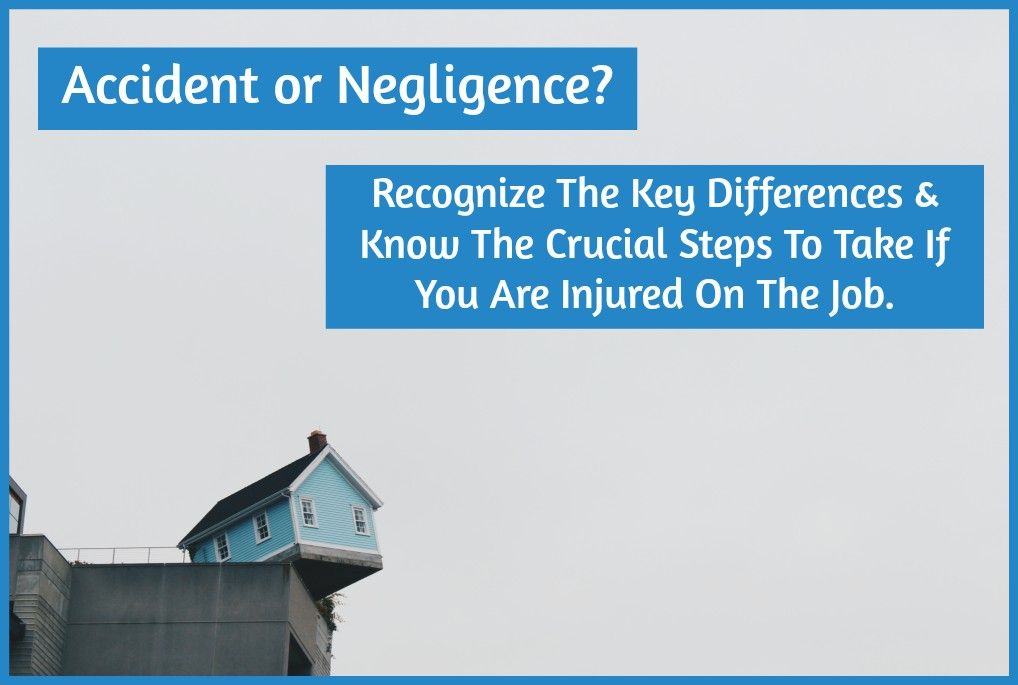
Accident or Negligence? Recognize The Key Differences
Know the Crucial Steps to Take If You Are Injured on the Job
Most of us go to work every day, do our jobs, and come home at the end of our shift in exchange for a paycheck. We have an underlying assumption that while we are there our safety is looked after through adequate measures by our employer. But sometimes that isn’t the case.
Whether it is a regular lack of care in the maintenance and upkeep of the premises and equipment or simply an oversight, sometimes accidents happen in the workplace because of someone’s neglect. When this happens to you, it can result in injuries, difficulty in performing your job, loss of wages, and more.
If you know that your injuries were a result of negligence and not simply an accident, you may be able to file a worker’s compensation claim in court.
What Does Negligence in the Workplace Look Like?
Negligence in the workplace can take many forms.
The entire package of your job is a cohesive unit where each individual part must do its job in order for the whole outcome to be successful. When one part fails due to negligence, there can be consequences to the entire unit.
This applies from the beginning of the job process when a person is hired. If someone is not screened properly and is not qualified for the job that they are placed in, this can be detrimental to the company’s bottom line. This may be something as simple as losing clients or customers or costing the business money through their incompetence.
However, it could be worse – if an employee is not screened carefully, they could pose a threat to their coworkers. Negligence in hiring happens every day when due diligence is not performed before an applicant is hired.
Staff placed in positions that require careful attention to detail, for instance, should be screened and hired accordingly. If someone has a record of being an alcoholic and comes to work drunk and neglects an important aspect of their job that results in someone’s injury, this is negligence in hiring.
Employer responsibility does not end there, though. Sometimes an employee’s background screening comes back clear, but their performance on the job causes red flags. Personnel who exhibit behavior that is deemed unsafe should have corrective action taken by the employer.
When this behavior is ignored, this is called negligent retention. If, in the course of that negligent retention, the staff member performs an action that results in injury, the employer can be held liable for the employee’s negligence.
The employer also has the responsibility to train any new hires to ensure they have the skills to complete the requirements of their position. Lack of training of equipment can result in injury to others, and the employer would be liable for those damages.
Finally, an employer is also responsible for supervision of all employees. This is a combination of training the employees correctly and monitoring them once they are working on their own. Employers that fail to monitor employees’ actions or ignore complaints from other employees can be held responsible for any damages that occur as a result.
When Does a Workplace Injury Go Beyond Accidental?
 In some cases, an employer can claim that a workplace injury was simply an accident, and we all know that accidents happen. However, many times that accident could have been avoided through due diligence, and that’s when it becomes negligence.
In some cases, an employer can claim that a workplace injury was simply an accident, and we all know that accidents happen. However, many times that accident could have been avoided through due diligence, and that’s when it becomes negligence.
There are many common forms of negligence that result in worker’s compensation lawsuits. These can include:
- The employer’s lack of workers’ compensation insurance, causing an injured employee to receive a delay in medical care and further medical conditions from their injuries.
- Intentional misconduct by the employer, such as requiring an employee to perform duties they are not qualified for.
- Employer’s retaliation against an employee, such as disciplining the employee or docking wages or hours, for filing a worker’s compensation claim.
- Third-party damages in which an employee or someone affiliated with the company was responsible for someone else’s injury.
- Discrimination of the employee by the employer or discrimination in the workplace by another employee. If the employer knew the actions were occurring and did not take steps to stop it, they can be held responsible.
- Dangerous chemicals used in the line of duty, where the employer knowingly placed the employee in harm’s way by requiring them to work with toxic substances without proper equipment.
- Employer’s negligence in allowing the use of defective work products and tools. If an employer knows that equipment is in need of repair and still allows it to be used, resulting in injury, they have not completed their duty in providing safe working conditions.
Proving Negligence in the Workplace
To show that you have been a victim of negligence on the job, you have the burden of proof. This means that you must paint a clear picture connecting the elements of the claim together.
There are four components that you must demonstrate.
You have to show that your employer owed you a duty of care to maintain a safe environment for you, the employee, per OSHA regulations. Then you need to prove that your employer breached their duty through neglecting their due diligence.
Once those two aspects are demonstrated, then you need to show that you were injured as a result of the employer’s neglect of their duty of care. This can be supported with evidence in the form of medical records.
Finally, you have to establish that the injuries you have incurred were a direct result of the breach of duty by your employer. This is where you must be able to correlate the injury to negligence rather than an unforeseeable accident. A knowledgeable attorney, like those at Robenalt Law Firm, Inc., can help you to connect the pieces together to prove your case.
Take Action to Get the Compensation You Deserve
If you believe that you have been a victim of an injury due to workplace negligence, call an expert attorney today to see if you have the right to compensation for your damages.
© New To HR


